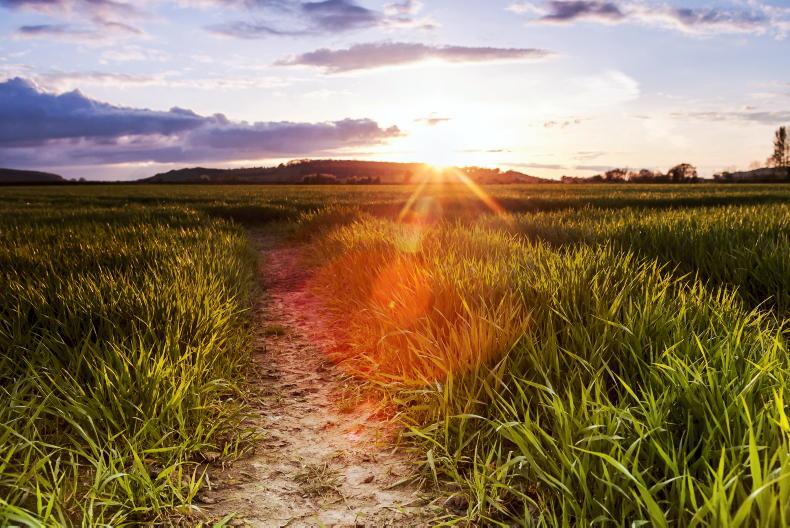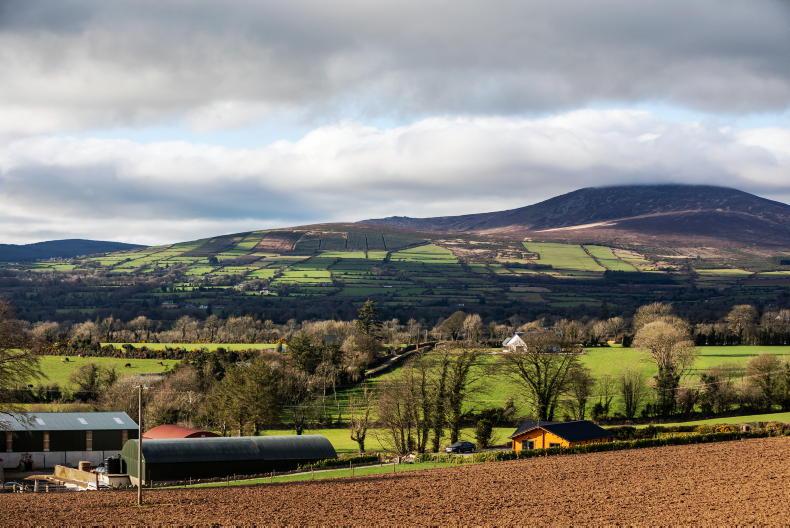Few of us will be sorry to see the back of 2020. It was a year that tested all aspects of society. We express our deepest sympathies to the many families that lost loved ones to COVID-19 – a horrible and unrelenting disease.
It is a disease that has caused an unprecedented challenge over the past 10 months – mentally, physically and, for many, financially. The uncertainty that lies ahead for 2021 is resting heavy on many of our minds.
However, we should take comfort from the extent to which the unprecedented challenges of 2020 have been met with an unprecedented response from Irish society. While challenged at times, seldom have we seen such unity of purpose – and never before have we seen such support for our healthcare workers and frontline services. We thank the thousands of workers that put the health of the nation ahead of their own personal safety. Let us never forget these true champions of society.
Within this, the farming community can stand tall. Despite the challenges, our sector kept food on the shelves– not just at home but abroad. No politician or policymaker should forget the level of panic-buying witnessed among consumers as the initial wave of the virus swept across the world. People view access to food differently from every other product.
The level of commitment from farmers, factory workers, Department of Agriculture officials, vets, hauliers, merchants and many more in keeping supply chains functioning should be acknowledged.
We should be extremely proud of how our industry has responded and the innovative measures deployed. Nowhere was this more evident than within our livestock marts, where online bidding was rolled out practically overnight. In the Irish Farmers Journal, we were delighted to be in a position to help support this initiative through the development of our MartBids platform.
While recognising the challenges that lie ahead, it is this commitment and innovation that should help us look to the future with confidence. In 2021, we will continue to face the challenge of COVID-19 while at the same time trying to adjust to a post-Brexit landscape. Ultimately, in the years ahead, we will see the true extent of both the Government’s and the EU’s commitment to supporting the income of Irish farmers to the new trading landscape.
As we have highlighted over the past four years, for farmers, the success of any Brexit deal can only be measured over time against the extent to which it maintains access for Irish product into the British market and the extent to which value is retained.
Unfortunately, in the absence of any further trade negotiations, we will see the value of the British market decline significantly as it opens up to non-EU food imports. While we cannot blame Irish or EU politicians for the outcome, we can hold both to account in how they respond to supporting farm incomes. The focus should not just be on financial support but the commitment to creating the market demand and value within the EU market. Delivery will require measures to curb the level of imports into the EU – particularly beef.
Meanwhile, policy decisions made in 2021 will shape the future direction of agriculture for years to come. Decisions on CAP reform, the development of the EU’s Farm to Fork and Biodiversity strategies and the further development of climate policies will all take place in the coming months. For farmers, it will be critical that these are science-led.
Farmers must not find themselves innocent bystanders in these discussions. They must hold the European Commission to account in relation to delivering on its commitment to having economic sustainability at the heart of the Farm to Fork strategy.
Farmers must insist that climate policy reflects the extent to which the understanding around the science pertaining to climate change has evolved – particularly in relation to the role of our soils and hedgerows in the retention and sequestration of carbon. As this policy evolves, we must ensure farmers’ role in the supply chain is protected in any subsequent carbon trading schemes.
Over the course of the next year, we will aim to keep our readers informed across the range of policy areas and market developments that will affect farm incomes. But as 2020 comes to a close, let us celebrate and take pride in how our industry responded in one of our darkest hours. In March 2020, when a world despaired, our industry united – to protect each other, keep food on the shelves and tend to our animals.
When asked, Irish farmers and our agri-food industry stood tall. As the development of vaccines brings light at the end of the tunnel, let us never forget and continually remind ourselves who our essential workers really are.

€100m with no strings attached
The power of the dairy processor and meat factory lobby is again evident.
Despite reports of farmers being first in the queue for Brexit supports, processors this week secured €100m in Government funding for market diversification.
The timing is strange given that the strategy for the past four years was supposed to have focused on diversifying markets. If required, why was this investment not made years ago in preparation? But perhaps the real question for farmers is why are there no strings attached beyond the normal terms and conditions?
Transparency
In the same way as the Government used BEAM supports to force farmers to reduce cattle numbers, why not require processors accessing the fund to commit to deliver increased market and price transparency?
Should funding for beef factories not have been linked to addressing the challenges identified in the Beef Market Taskforce and/or conditional on signing up to the US model of price transparency?
The line that the Government has no power over private beef companies does not hold water when granting access to €100m of taxpayers’ money.
Brexit negotiations will continue
There will be no shortage of work for the 18 specialised trade committees that were established as part of the EU-UK trade deal reached last week.
Top of the agenda for the sanitary and phytosanitary committee will be dealing with the many outstanding issues relating to the trade in agricultural commodities between Britain and Northern Ireland. Rules pertaining to the movement of live animals and seed potatoes have yet to be fully clarified. The issue of NI milk being granted access to existing EU free-trade arrangements is still without solution.
A take-it-or-leave-it approach to science
COVID-19 has shone a very important light on the societal value of science. We all hope that the rollout of a vaccine early in 2021 will allow us to go back to a closer sense of normality.
The scientific community has once again proved its value. Against this backdrop, it is unfortunate that in the case of EU agriculture, we see the direction of policy continue to ignore the latest scientific developments – many of which could significantly improve both the environmental and economic sustainability of the sector while enhancing the nutritional value of farm produce.
We should not have a take-it-or-leave-it approach to science. If we trust the science and the regulatory oversight bodies to deliver a safe and effective vaccine against COVID-19, we should also trust it in shaping our food production models.
Few of us will be sorry to see the back of 2020. It was a year that tested all aspects of society. We express our deepest sympathies to the many families that lost loved ones to COVID-19 – a horrible and unrelenting disease.
It is a disease that has caused an unprecedented challenge over the past 10 months – mentally, physically and, for many, financially. The uncertainty that lies ahead for 2021 is resting heavy on many of our minds.
However, we should take comfort from the extent to which the unprecedented challenges of 2020 have been met with an unprecedented response from Irish society. While challenged at times, seldom have we seen such unity of purpose – and never before have we seen such support for our healthcare workers and frontline services. We thank the thousands of workers that put the health of the nation ahead of their own personal safety. Let us never forget these true champions of society.
Within this, the farming community can stand tall. Despite the challenges, our sector kept food on the shelves– not just at home but abroad. No politician or policymaker should forget the level of panic-buying witnessed among consumers as the initial wave of the virus swept across the world. People view access to food differently from every other product.
The level of commitment from farmers, factory workers, Department of Agriculture officials, vets, hauliers, merchants and many more in keeping supply chains functioning should be acknowledged.
We should be extremely proud of how our industry has responded and the innovative measures deployed. Nowhere was this more evident than within our livestock marts, where online bidding was rolled out practically overnight. In the Irish Farmers Journal, we were delighted to be in a position to help support this initiative through the development of our MartBids platform.
While recognising the challenges that lie ahead, it is this commitment and innovation that should help us look to the future with confidence. In 2021, we will continue to face the challenge of COVID-19 while at the same time trying to adjust to a post-Brexit landscape. Ultimately, in the years ahead, we will see the true extent of both the Government’s and the EU’s commitment to supporting the income of Irish farmers to the new trading landscape.
As we have highlighted over the past four years, for farmers, the success of any Brexit deal can only be measured over time against the extent to which it maintains access for Irish product into the British market and the extent to which value is retained.
Unfortunately, in the absence of any further trade negotiations, we will see the value of the British market decline significantly as it opens up to non-EU food imports. While we cannot blame Irish or EU politicians for the outcome, we can hold both to account in how they respond to supporting farm incomes. The focus should not just be on financial support but the commitment to creating the market demand and value within the EU market. Delivery will require measures to curb the level of imports into the EU – particularly beef.
Meanwhile, policy decisions made in 2021 will shape the future direction of agriculture for years to come. Decisions on CAP reform, the development of the EU’s Farm to Fork and Biodiversity strategies and the further development of climate policies will all take place in the coming months. For farmers, it will be critical that these are science-led.
Farmers must not find themselves innocent bystanders in these discussions. They must hold the European Commission to account in relation to delivering on its commitment to having economic sustainability at the heart of the Farm to Fork strategy.
Farmers must insist that climate policy reflects the extent to which the understanding around the science pertaining to climate change has evolved – particularly in relation to the role of our soils and hedgerows in the retention and sequestration of carbon. As this policy evolves, we must ensure farmers’ role in the supply chain is protected in any subsequent carbon trading schemes.
Over the course of the next year, we will aim to keep our readers informed across the range of policy areas and market developments that will affect farm incomes. But as 2020 comes to a close, let us celebrate and take pride in how our industry responded in one of our darkest hours. In March 2020, when a world despaired, our industry united – to protect each other, keep food on the shelves and tend to our animals.
When asked, Irish farmers and our agri-food industry stood tall. As the development of vaccines brings light at the end of the tunnel, let us never forget and continually remind ourselves who our essential workers really are.

€100m with no strings attached
The power of the dairy processor and meat factory lobby is again evident.
Despite reports of farmers being first in the queue for Brexit supports, processors this week secured €100m in Government funding for market diversification.
The timing is strange given that the strategy for the past four years was supposed to have focused on diversifying markets. If required, why was this investment not made years ago in preparation? But perhaps the real question for farmers is why are there no strings attached beyond the normal terms and conditions?
Transparency
In the same way as the Government used BEAM supports to force farmers to reduce cattle numbers, why not require processors accessing the fund to commit to deliver increased market and price transparency?
Should funding for beef factories not have been linked to addressing the challenges identified in the Beef Market Taskforce and/or conditional on signing up to the US model of price transparency?
The line that the Government has no power over private beef companies does not hold water when granting access to €100m of taxpayers’ money.
Brexit negotiations will continue
There will be no shortage of work for the 18 specialised trade committees that were established as part of the EU-UK trade deal reached last week.
Top of the agenda for the sanitary and phytosanitary committee will be dealing with the many outstanding issues relating to the trade in agricultural commodities between Britain and Northern Ireland. Rules pertaining to the movement of live animals and seed potatoes have yet to be fully clarified. The issue of NI milk being granted access to existing EU free-trade arrangements is still without solution.
A take-it-or-leave-it approach to science
COVID-19 has shone a very important light on the societal value of science. We all hope that the rollout of a vaccine early in 2021 will allow us to go back to a closer sense of normality.
The scientific community has once again proved its value. Against this backdrop, it is unfortunate that in the case of EU agriculture, we see the direction of policy continue to ignore the latest scientific developments – many of which could significantly improve both the environmental and economic sustainability of the sector while enhancing the nutritional value of farm produce.
We should not have a take-it-or-leave-it approach to science. If we trust the science and the regulatory oversight bodies to deliver a safe and effective vaccine against COVID-19, we should also trust it in shaping our food production models.









SHARING OPTIONS